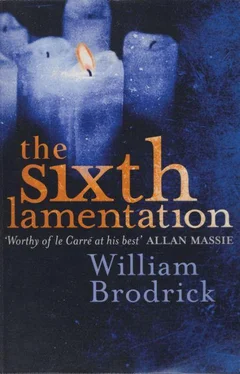William Brodrick - The Sixth Lamentation
Здесь есть возможность читать онлайн «William Brodrick - The Sixth Lamentation» весь текст электронной книги совершенно бесплатно (целиком полную версию без сокращений). В некоторых случаях можно слушать аудио, скачать через торрент в формате fb2 и присутствует краткое содержание. Жанр: Триллер, на английском языке. Описание произведения, (предисловие) а так же отзывы посетителей доступны на портале библиотеки ЛибКат.
- Название:The Sixth Lamentation
- Автор:
- Жанр:
- Год:неизвестен
- ISBN:нет данных
- Рейтинг книги:5 / 5. Голосов: 1
-
Избранное:Добавить в избранное
- Отзывы:
-
Ваша оценка:
- 100
- 1
- 2
- 3
- 4
- 5
The Sixth Lamentation: краткое содержание, описание и аннотация
Предлагаем к чтению аннотацию, описание, краткое содержание или предисловие (зависит от того, что написал сам автор книги «The Sixth Lamentation»). Если вы не нашли необходимую информацию о книге — напишите в комментариях, мы постараемся отыскать её.
The Sixth Lamentation — читать онлайн бесплатно полную книгу (весь текст) целиком
Ниже представлен текст книги, разбитый по страницам. Система сохранения места последней прочитанной страницы, позволяет с удобством читать онлайн бесплатно книгу «The Sixth Lamentation», без необходимости каждый раз заново искать на чём Вы остановились. Поставьте закладку, и сможете в любой момент перейти на страницу, на которой закончили чтение.
Интервал:
Закладка:
His father, exasperated, said: ‘Pascal, I’m asking you to leave it be. Leave the past alone.’ Etienne went angrily to his study without waiting for a reply as if parental censure was sufficient to deflect a disobedient son.
As with most adult passions, they are born in childhood. The strength of Pascal’s conviction had not come from his family as such but from their butler, Mr Snyman. He’d known Jacques and had told Pascal all about The Round Table. For Pascal he was a patriarch, the only survivor of the times. After his father left the room, Mr Snyman slipped in.
‘Did you hear all of that?’ asked Pascal.
‘Yes.’
‘What would you do?’
‘It’s not what I’d do that matters; it’s what Jacques would do. If he could.’
‘And what’s that?’
Mr Snyman took a step closer, his hands raised as if what he had to say was so fragile it might break if not physically handed over. ‘He’d hunt him down. Schwermann is one of those few people responsible for something that lies on the other side of forgiveness. ‘
Pascal went upstairs and knocked on the study door.
‘Papa, I’m sorry. I have to do this.’
‘You’ll regret ignoring my advice.’ His father stood with his back to his son. With profound disappointment he said, ‘You care more for the dead than the living.’
Monique stood at the door, wavering between husband and son. She was crying.
Then Pascal said something untrue, something he did not mean and which he bitterly regretted afterwards. But it sounded good. ‘And you care more for political preferment than the truth.’
They had, of course, spoken since; and Pascal had said sorry, and his father had said it didn’t matter, and his mother had run out to the patisserie. But it was too late. Certain things, once said, can change at a stroke the interior workings of love, leaving the outside architecture untouched. Perhaps, thought Lucy, that was why Agnes had taken such deep refuge in silence.
Pascal made contact with Jewish groups and Resistance organisations in Paris who formed a consortium: the laborious process of gathering evidence began. The anxiety of the investigators was that Schwermann had kept a low profile as far as the paperwork was concerned. His name rarely appeared in print even though sources demonstrated he must have been at certain meetings and received particular memos. And no one knew the name under which he was hiding. Then Pascal received an anonymous letter posted from Paris. He said, ‘It contained one line: “The name you seek is Nightingale.” I thought it was a hoax but I passed it on.
The problem of building a case strong enough to secure a conviction, however, remained a concern. It was while discussing this matter with Mr Snyman that Pascal had been urged to find Victor. Mr Snyman had said:
‘I knew Victor. He was like a brother to Jacques. Things became difficult between them when they fell in love with the same woman — I forget her name… the war split them further… but now, after so many years, when Jacques is dead… I am sure he would speak out.’
Lucy studied Pascal’s animated face with concealed horror: he seemed to know nothing of Agnes. The narrative moved on, leaving Lucy stunned by the omission. The allegations were formally laid with the Home Office. And, life being what it is, no political discomfort came to trouble Pascal’s father. The lesion between them lay open, through a fear that was never, in fact, realised.
A bell rang, urgent and frantic, for last orders. Pascal and Lucy decided to leave. On their way out Lucy caught the eye of The Don — as she’d named him — that warming fusion of Gandalf and Father Christmas. As before, he bestowed a nod.
Standing outside, Lucy said, ‘Brionne is not going to walk into a police station. It’s a fond hope, nothing else.’
‘I know,’ said Pascal with resignation. ‘We need a miracle.’
‘I thought you said we couldn’t mention God?’
‘In certain circumstances God has a habit of mentioning himself.’
2
Anselm’s confidence in finding Victor Brionne lay not in his investigative powers, for he had none, but in one of the more prosaic features of modern life: the proliferation of countless documents with lists of names and addresses. The Inland Revenue, the Department of Social Security, National Insurance, the National Health Service Central Register, the Drivers Register, and more, beyond imagination. Three things only were needed by an amateur in Anselm’s curious position: the name of the person concerned; a contact in the police involved in the investigation of a serious crime (which opened many closed doors); and a good reason why that contact would reveal what they learned to the amateur.
Anselm was relatively sure he possessed all three conditions. He knew the name; instinct suggested DI Armstrong could be the contact; and her cooperation might be forthcoming if its basis was the finding of a key witness for a major trial, Anselm’s only request being to have the first interview The plan crystallised almost by itself while he was still in Rome. And as it did so, Anselm’s recognition of his own importance in the scheme of things expanded proportionately, producing a sense of power that he tried to suppress but which he acknowledged with a dark flush of pleasure.
3
Ordinarily Anselm had two periods of manual work — one in the morning before Mass, the other in the afternoon until Vespers. However, the Prior had agreed to release Anselm whenever necessary to pursue anything to do with the task he had received from Cardinal Vincenzi. That broad principle was stretched to encompass games of chess with Salomon Lachaise at the guesthouse. But since his trip to Rome Anselm had found it difficult to look his companion in the face — for he was now burdened with a riddle: ‘Schwermann had risked his life to save life: And his task of finding Victor Brionne now set them apart, for it was this man who would reveal the meaning of the words.
They sat either side of a table, black against white.
‘No talking,’ said Anselm as they were about to start.
‘But in the beginning was the Word,’ replied Salomon Lachaise.
‘Indeed,’ said Anselm.
Salomon Lachaise then sprinkled the early stages of play with abstract enticements — an unworthy attempt, thought Anselm, to distract his opponent: ‘A violation of language is a violation of God: (‘Mmm’, said Anselm.) ‘… in hell there are no words.’ (‘Mmm.’) ‘… and yet the silence of the Priory brings forth words of praise.’ (‘And other things,’ murmured Anselm.) ‘… the world will be redeemed by words.’ Anselm marked that one for future use. -
‘Is it not strange,’ continued Salomon Lachaise on a fresh tack, ‘that God, on one reading of Exodus, refused to disclose his name to Moses when he first revealed himself?’
‘Yes,’ said Anselm. He eyed the tight configuration of pieces. Each move seemed to spell trouble but there had to be a way out.
‘And is it not stranger still that God should change the name of his servants to mark a new beginning?’
Anselm looked up sharply into a face of restrained curiosity. ‘What do you mean?’
‘God made the covenant with Abram and he became Abraham. Simon the fisherman became Peter the rock. There are lots of examples.’
‘I see,’ said Anselm, returning his attention to the battle.
‘The change of name obliterates their past, bestowing a blessed future.’
‘That’s a good point. I might use that one Sunday’
‘And when the Amsterdam synagogue expelled Spinoza for his ideas, they invoked God to blot out his name under heaven.’
‘That’s interesting,’ said Anselm genuinely
Читать дальшеИнтервал:
Закладка:
Похожие книги на «The Sixth Lamentation»
Представляем Вашему вниманию похожие книги на «The Sixth Lamentation» списком для выбора. Мы отобрали схожую по названию и смыслу литературу в надежде предоставить читателям больше вариантов отыскать новые, интересные, ещё непрочитанные произведения.
Обсуждение, отзывы о книге «The Sixth Lamentation» и просто собственные мнения читателей. Оставьте ваши комментарии, напишите, что Вы думаете о произведении, его смысле или главных героях. Укажите что конкретно понравилось, а что нет, и почему Вы так считаете.












